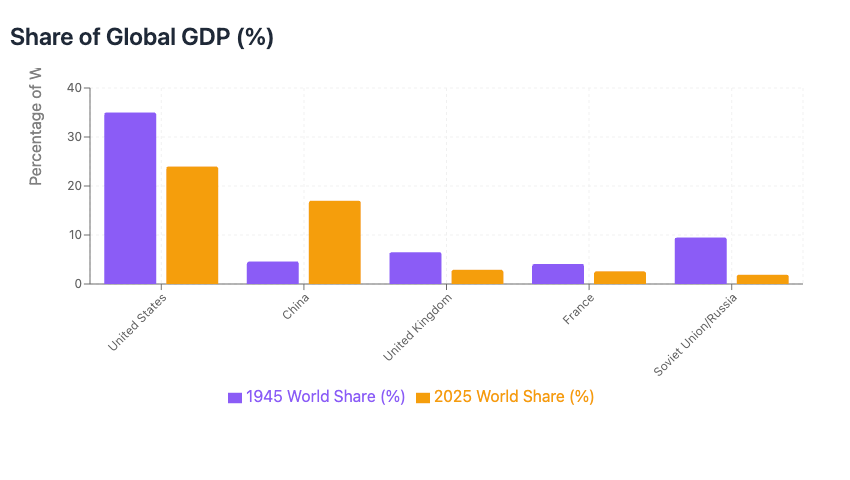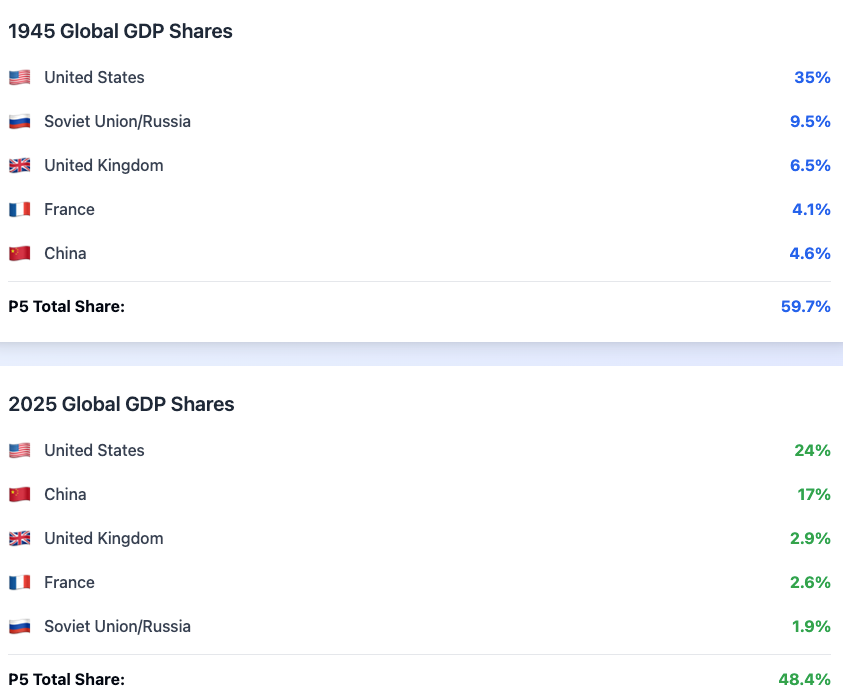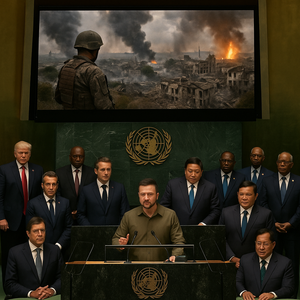There is no question that the world is in a period of global geopolitical flux. If only there were a global forum where you could hear the world's leaders address these pressing challenges and propose a way to benefit all of humankind. Wait a minute …
The 80th General Assembly High-Level Week began on September 23, when more than 150 leaders addressed the United Nations. I’m willing to bet this landmark event was largely ignored by planet Earth. There have been a few news stories, but given the pressing nature of the issues, the fact that we are at a pivotal crossroads moment, and the complexity of the task ahead, I would suggest that public attention to the event was disproportionately minimal, at best.
Allow me to assist here. I’m interested in the UN for a host of reasons, and I’ve actually listened to a bunch of the speeches and read a number of others - that’s how sad I am. The truth is, very few people care about the UN anymore. My guess is that most see it as just a windy talk shop (it's not, btw; the UN does enormously valuable work in ways and places people massively underestimate.) But I would guess the broad public perception is of a “toothless relic”, and if that’s true, it might be worth asking why.
Remarkably, several of the speeches addressed precisely this question. To save you time, I’m going to tell you that if you are interested enough to explore them further, there are really only two speeches of significance, and neither was delivered by the people you might expect. But let me first tell you who you don’t need to watch.
US President Donald Trump’s speech was - surprise! - boorish, boosterish, and juvenile. President Ramaphosa’s speech was, frankly, stultifying. Colombian President Gustavo Petro’s speech was ludicrous, calling for an international “army” to stop “genocide,” and urging US soldiers to disobey orders. Indonesian president Prabowo Subianto was very forceful and came up with a great phrase: “Might cannot be right; right must be right”. French President Emmanuel Macron’s speech was heralded by the local press as historic (it wasn’t), but personally, I was just relieved to see a French president who is not actually in jail. Secretary-General António Guterres’ speech was actually very sweet - and much more positive than you might think for an organisation palpably on the decline.
Right, on the important people in the world today: First, Finnish president Alexander Stubb. Surprised? You shouldn’t be. First, he has been studying international relations for his entire life, notably doing a doctorate at the London School of Economics on - what else? - “flexible integration” in the context of the EU.
Honestly, this speech is worth listening to in its entirety - especially if you represent another medium-sized country, like, say, South Africa. He didn’t begin with the history of the UN, how it was forged in the shadow of the pain and desolation of the Second World War. He started with the now. He just smacked right into it.
Opening words: “In its simplest form, foreign policy is really about three things: values, interests, and power”. No clutching of the pearls. No grand appeals to history. Not triumphalism or despondency.
And this is the frame: “I think the post-Cold War order is over, but we do not yet know what the new order will look like.” So now the job is defined. But “regardless of size, each and every member state of the UN has agency - a say in how the new world order will look like. It is important that we all use this power wisely and responsibly.”
Then there was a bit about war, with no hand-wringing but clear values: “War is always a failure of humanity.” And later: “Russia has no right to continue its aggression against Ukraine. Israel has no right to violate international law in Palestine. States have no right to use Sudanese or Congolese territories to fight proxy wars for their economic or strategic self-interest.” He also ended with a reference to Nelson Mandela, always a good sign IMHO.
And then a concrete proposal for a solution: The Security Council should have five more permanent seats: two new seats for Asia, two for Africa, and one for Latin America. And one other big thing: no single state should have veto power. “If a member of the Security Council violates the UN Charter, its voting rights should be suspended.” Ooof.
Actually, reform of the UN system was a theme of the speeches, but before we get to that, what about the other global leader of the moment, Ukrainian President Volodymyr Zelensky? We have heard him many times on Russian aggression, but what struck me about this speech was his evolving view of the character of the war.
How spine-chilling is this comment, for example? “Stopping Russia now is cheaper than wondering who will be the first to create a simple drone carrying a nuclear warhead.”
And he also broke some news. We know that Polish and Estonian airspace has now been violated by Russian drones. What we didn’t know is that the Europeans didn’t know what kind of drones they were, or what route they took. How creepy is that?
And so Zelenskyy concludes that "the world moves too slowly to protect itself, and weapons move fast". And also that, "There are no security guarantees except friends and weapons".
There is a lot more (on drone dead-zones, for example), but you get the idea: there is something about the experience gained from the front line that makes his perspective so riveting.
So, back to that idea to reform the Security Council (and as a South African, I feel we should be issuing a global apology at this point, which I’ll get to in a bit).
The essential reason that the UN's image is in decline is that, as Stubb pointed out, in times of increased uncertainty and conflict, countries are tempted by transactionalism and tend to desert their values. One way to stop this is to do precisely the thing the UN has set itself firmly against for its entire existence, and that is to boot out the countries that don’t belong in the organisation.
As it stands, the UN has no power but the grandiose, and rater empty, call to destiny. That was enough in times of global cooperation, but it's transparently not enough in times when geographic integrity is routinely violated on a whim by this chancer or that megalomaniac. There has to be a graduated and more granular consequence for flouting international law. So a “reformed” Security Council makes sense.
This would also better reflect global economic power. In 1945, when the Security Council was established, the five permanent members constituted about 60% of global GDP; they now constitute less than half. But it's so much more skewed than that - it’s only that high because China’s recent rise boosts the proportion. The UK, France, and Russia represent no greater slice of global GDP than a host of other countries. And these are not just the countries that lost during WWII, Germany and Japan. There is the country most egregiously left out, India, and a bunch of others.

Russia’s GDP is now smaller than Canada's or Brazil's and not much larger than Spain's or Mexico's; the fact that Russia is a permanent member of the council in possession of a veto as opposed to any of these countries is merely a dint of history, which anyone with an ounce of intellectual honesty would admit.

But the problem is that the UN is now in a circular vice: the parties with the veto obviously don’t want their exclusivity diminished, so they will inevitably - wait for it - veto any suggestion of Security Council reform. It's a classic vicious circle. And that brings us back to South Africa’s responsibility for this parlous situation in the form of the person who designed this unfortunate calamity, Jan Christiaan Smuts (I'm being a little tongue-in-cheek here).
Smuts was very conscious of his previous failed attempt at creating a global, multilateral powerhouse, the League of Nations, as well he might be, since nobody else other than him at the San Francisco Conference in 1945 was around when the League was conceived at Versailles in 1919. He was an early and vocal supporter of the notion of the Security Council veto, arguing, “better to have a living organisation with limitations than a dead one with none”, i.e., without the veto. Without no veto power, he believed, the "Great Powers" would never join. And that was exactly the failure of the League which the US never joined. So he needed to bait the hook.
He also wasn’t above a little hypocrisy, as we know, since he supported the Universal Declaration of Human Rights (in fact, he wrote it), while denying those very same rights to his own population. But presumably, he would argue that, actually, he was not as inconsistent as it might appear, since in both cases he was essentially arguing for pragmatic paternalism that could and should (and did) evolve over time.
Anyway, the point is that Smut’s vision was successful - then. Now, times have changed, and the UN is in crisis. But how much more of a crisis is it in than it would be anyway? Hard to tell.
I think we have to rely on the expert here. As Stubb said, “Reform is not about weakening the UN - it is about making it more legitimate and more relevant”. And, “The United Nations must represent today’s world, not the world of eighty years ago.”
Echo that. But don’t hold your breath. 💥
From the department of NOW we're talking ...

From the department of men who think about ancient Rome far too much ...
From the department of innovation that never ends ...
Thanks for reading - please do share if you have a friend (or enemy!) you think would value this blog and ask them to add their email in the block below - it's free for the time being. If the sign-up link doesn't appear, you'll find it on the site.
Till next time. 💥
💥💥💥




Join the conversation